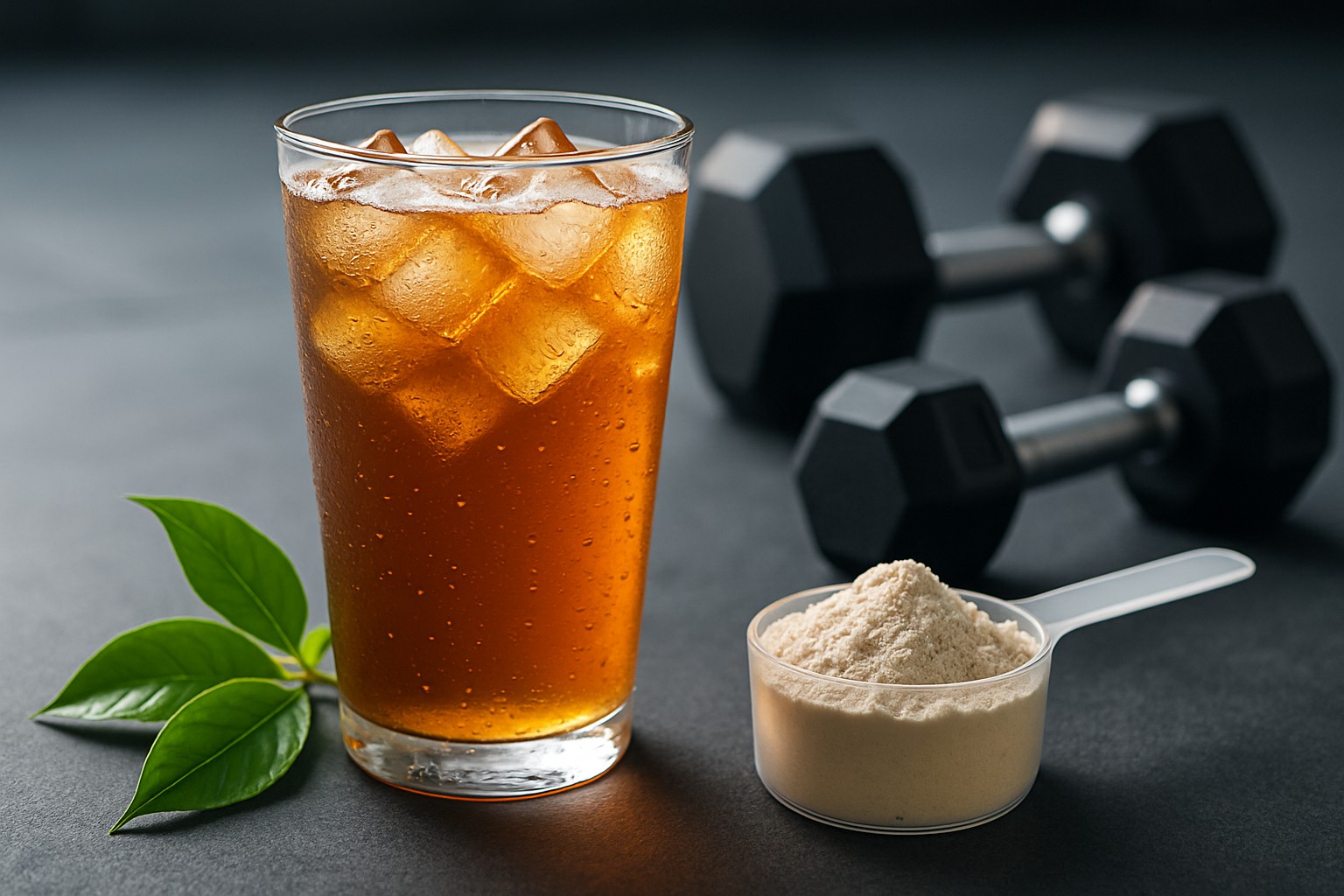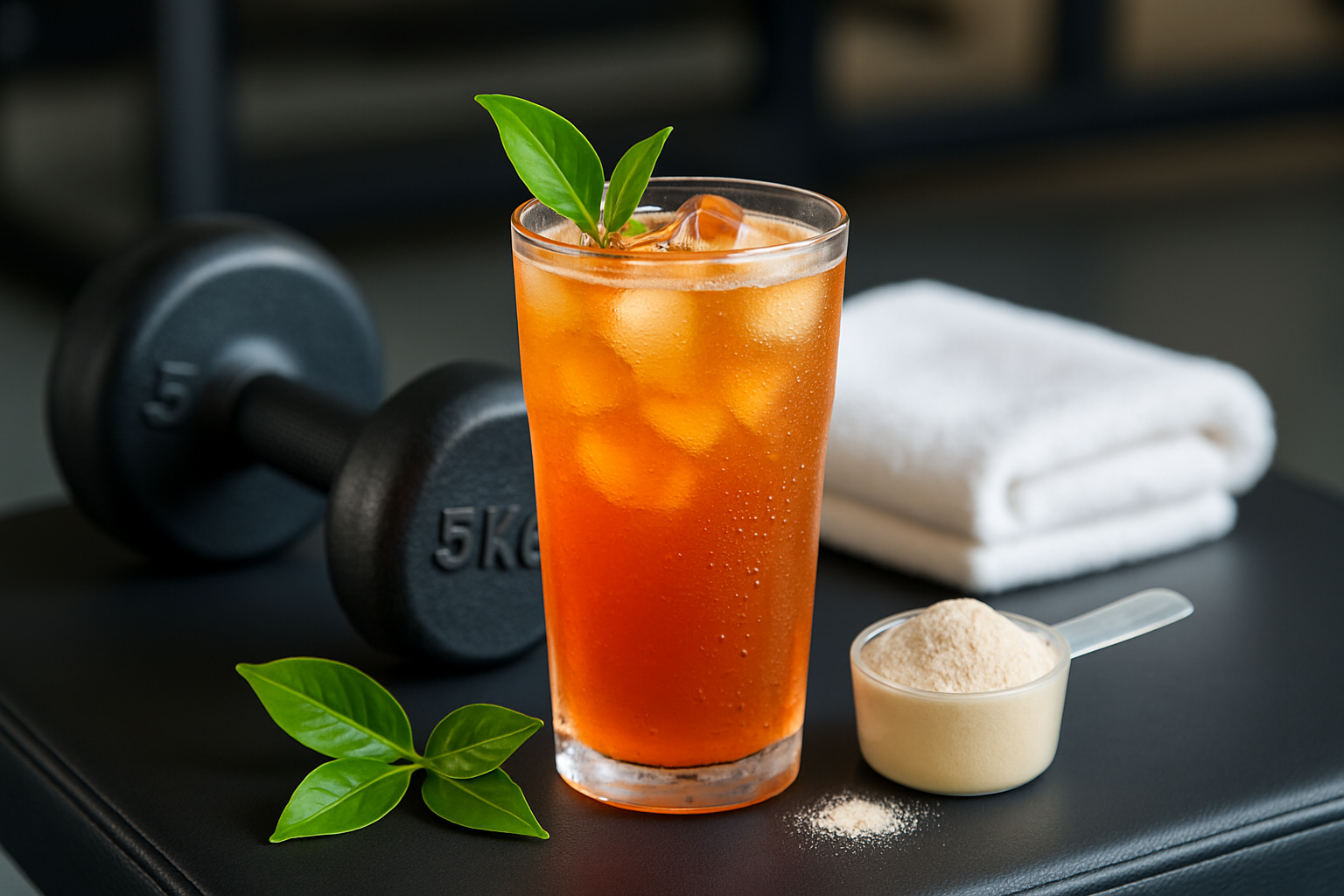Protein Ice Tea Benefits for Post Workout Recovery

Post workout recovery holds the key to repairing hardworking muscles and easing nagging soreness while giving your fitness progress a solid boost. Protein ice tea has quietly stolen the spotlight as a refreshingly effective option. It mixes quality protein with hydrating tea in a way that is not only tasty but also an enjoyable method to replenish vital nutrients after a sweat session.
This article dives into the unique perks protein iced tea brings to the table for post-workout recovery. Backed by scientific studies and real-world examples, it sheds light on why this combo really packs a punch. We’ll take a closer look at its nutritional profile and how it supports hydration and muscle repair. It also delivers antioxidant benefits and its tasty flavor often makes it a regular in people’s routines.
What Exactly Is Protein Ice Tea Anyway?
Protein ice tea is a clever concoction that combines protein—often whey or plant-based—with brewed tea served chilled. It usually contains natural sweeteners, a splash of electrolytes and some tasty flavor boosters.
Unlike your usual protein shakes that zero in just on packing protein or hydration drinks like plain water and electrolyte drinks, protein ice tea manages to blend the best of both worlds. It combines muscle-repairing proteins with refreshing, antioxidant-rich tea.

Refreshing glass of protein ice tea highlighting its ingredients and post workout setting
Important Nutritional Benefits for Recovering After a Workout (Because Your Body Deserves a Little Extra TLC)
Protein ice tea packs a punch with key macronutrients and top-notch protein that’s great for muscle repair. It also has micronutrients like antioxidants and electrolytes that ease inflammation and replenish glycogen stores.
- Protein packed with a full amino acid profile gives your muscles what they need to bounce back and grow after tough workouts.
- The natural hydration kick from tea combined with electrolytes helps keep your fluid levels in check and can ease annoying cramps.
- Antioxidants in various teas work behind the scenes to lower oxidative stress and boost your immune system.
- Many protein iced tea options come low on sugar so you skip nasty insulin spikes while replenishing important nutrients.
- Because they tend to be light on calories, protein iced tea is a refreshingly effective recovery drink that won’t tip the scales or weigh you down.
Staying Hydrated and Keeping Your Electrolytes in Check
Staying well hydrated is important for bouncing back after a tough workout as it supports muscle repair and keeps your brain sharp. Tea-based drinks combined with protein and electrolytes like sodium, potassium and magnesium give your body a speedy ticket back to fluid balance. This combo usually helps zap stubborn tiredness, ease muscle cramps and cuts down on a slow recovery slog.
"Staying hydrated with the right mix of electrolytes is important for keeping your muscles firing on all cylinders and bouncing back quicker by maintaining that delicate cellular balance everyone talks about." – Dr. Melissa Houghton, Sports Nutrition Scientist
Supporting Muscle Repair and Growth Your Body's Comeback Story
The protein found in iced tea plays a handy role in supporting muscle protein synthesis by delivering essential amino acids right when your body needs them. This not only helps curb muscle breakdown but also gives recovery a nice little boost.
- Branched-chain amino acids (BCAAs) in the protein help with muscle repair and ease post-workout soreness.
- Sipping on protein iced tea within 30 to 60 minutes after your workout gives muscle recovery a boost.
- Whey protein absorbs quickly and delivers a fast-acting punch. Plant-based options take their time and offer a slower, steadier release of amino acids.
- The antioxidants in tea work with the protein to reduce inflammation and soothe oxidative stress in muscles.
How Antioxidants Can Pitch In to Calm Inflammation
Tea is packed with antioxidants that help tackle the oxidative stress and inflammation that often follow a good workout. These handy compounds can soothe muscle soreness and lend a hand in speeding up recovery.
Common teas you find in protein iced tea like green tea are usually packed with catechins—those mighty antioxidants that do some serious heavy lifting. Studies have shown these compounds can help dial down muscle damage and inflammation, which is a blessing if you have been pushing yourself hard.
Convenience and Taste Keep Recovery on Track
Protein ice tea delivers a cool, refreshing punch and comes in a variety of flavors—just the ticket to help individuals stay on track with their recovery routines. It’s a great way to shake up the usual monotony or fight off that all-too-common flavor fatigue that sneaks in with regular recovery shakes.
- A variety of flavors ranging from fruity to herbal keeps things from getting boring and makes each sip a little adventure.
- Portable bottles and ready-to-drink options mean you can enjoy it on the fly no fuss no mess.
- Simple preparation that hardly demands any mixing or refrigeration fits perfectly into those hectic grab-and-go moments.
- Usually lighter on calories compared to creamy smoothies so it hits the spot without weighing you down.
- Its cool refreshing vibe practically nudges you to drink up especially when the heat is on or summer rolls around.
Helpful Tips for Adding Protein Ice Tea to Your Recovery Routine - A Few Tricks Up Your Sleeve
Try to sip on protein iced tea within 30 to 60 minutes after your workout—this window is where the magic happens. Aim for servings packing 20 to 30 grams of protein, plus enough fluids to keep you hydrated.
Aim to get your protein fix within 30 to 60 minutes after your workout. That sweet spot really helps you squeeze the most benefit out of it.
When you are on the hunt, look for protein iced tea options that pack about 20 to 30 grams of quality protein per serving. This is a handy way to give your muscles a proper tune-up.
Don’t forget to keep those fluids flowing, especially after a tough or marathon session because hydration is your trusty sidekick in recovery.
Whether you’re whipping up a homemade blend or grabbing something convenient off the shelf, pick what suits your schedule and taste buds since nobody likes a protein drink they dread.
Keep tabs on how your body’s bouncing back. If soreness or fatigue sticks around, it might be time to tweak your protein intake a bit.
The Solid Science Behind Why Protein Ice Tea Deserves a Spot in Your Fridge
Several studies suggest that having protein after a workout can really help ease muscle soreness and get your strength back on track sooner than you might expect. Antioxidants lurking in tea—like those trusty catechins—seem to chip away at inflammation and muscle damage caused by oxidative stress.
| Study Name | Sample Size | Intervention | Outcomes on Recovery | Conclusions |
|---|---|---|---|---|
| Journal of Sports Nutrition 2019 | 45 | Whey protein + green tea catechins | Helped ease muscle soreness and dial down inflammation while giving strength recovery a nice little boost | Confirmed that pairing protein with tea antioxidants really clicks together |
| European J. of Applied Physiology 2020 | 60 | Plant-based protein ice tea | Improved glycogen replenishment and gave hydration levels a solid lift | Shows real promise as a plant-based pick for muscle repair and hydration, which is great news for vegans and the curious alike |
| Nutrients 2021 | 50 | Protein shakes vs. protein ice tea | Protein ice tea came out ahead with better antioxidant activity and hydration perks | Suggests mixing protein with tea antioxidants might just be the secret sauce for speeding up recovery |
| Sports Medicine 2022 | 70 | Electrolyte-fortified protein tea | Helped ease cramping and gave fluid retention a noticeable boost | Highlights how important electrolytes are when it comes to locking in hydration benefits |
"> "High-quality protein teamed up with antioxidants from tea makes for a pretty solid combo to help muscles bounce back. It usually cuts down on muscle damage and gives you a quicker ticket back to feeling like your best self." – Dr. Alan Becker, Exercise Physiologist
Protein iced tea has been steadily gaining popularity, but there are still people who wonder if it really does outperform the old-school routine of taking protein and hydration supplements separately. It’s not necessarily a perfect fit for everyone’s needs, but its combo of nutrients definitely makes it a pretty handy all-in-one recovery drink.
Who could really benefit from Protein Ice Tea when it comes to recovery?
Protein ice tea tends to do the trick for all sorts of people looking to bounce back faster. We are talking endurance athletes who need to top up their fluids and give their muscles a helping hand. Strength trainers chase that extra muscle gain and casual gym-goers want a tasty no-fuss recovery buddy.
- Endurance athletes who go through serious fluid loss and are eager for a quick muscle recovery to keep them moving.
- Weightlifters and strength trainers aiming not just for muscle growth but for faster repair.
- Individuals who don’t tolerate sugary recovery drinks well and prefer to keep things light on the sugar front.
- Fitness enthusiasts who love the convenience of ready-to-go products, especially those that offer a tasty variety of flavors for their post-workout boost.
- Vegetarians or vegans on the lookout for plant-based protein ice teas that check all their dietary boxes without compromising on taste.
Possible Limitations and Things to Keep in Mind (Just a Few Heads-Up Moments)
Protein iced tea brings a bunch of perks to the table, though there are a few things worth keeping on your radar. If you’re allergic to milk or handle lactose about as well as a bull in a china shop, it’s best to dodge dairy-based protein options altogether. As for the caffeine lurking in some teas, it might stir up a bit too much buzz for those sensitive to stimulants. Keep an eye on your calorie count either—some varieties sneak in added sugars or flavorings that quietly pile on.
Make the most of your recovery by choosing protein ice tea formulas that keep added sugar to a minimum and steer clear of artificial additives—they tend to dull those valuable antioxidant benefits and can mess with your digestion more than you would like.





